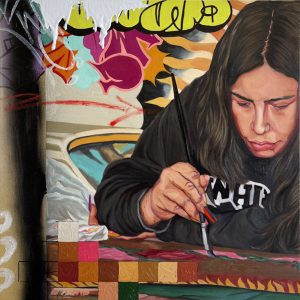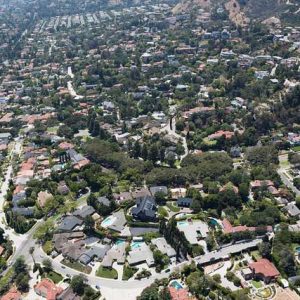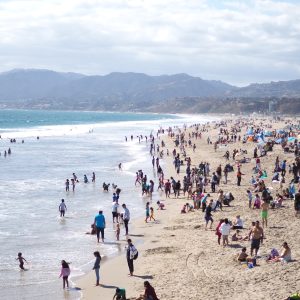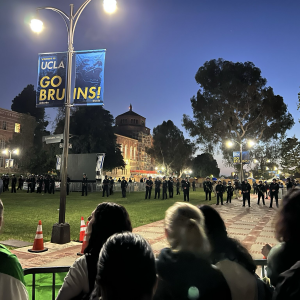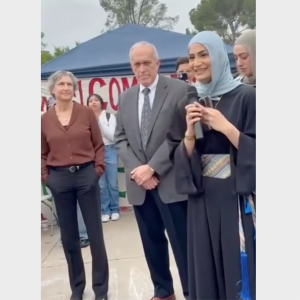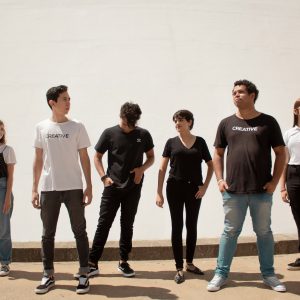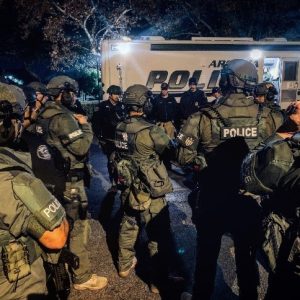 View Winners →
View Winners → Visual Journalists File Suit Against State of California
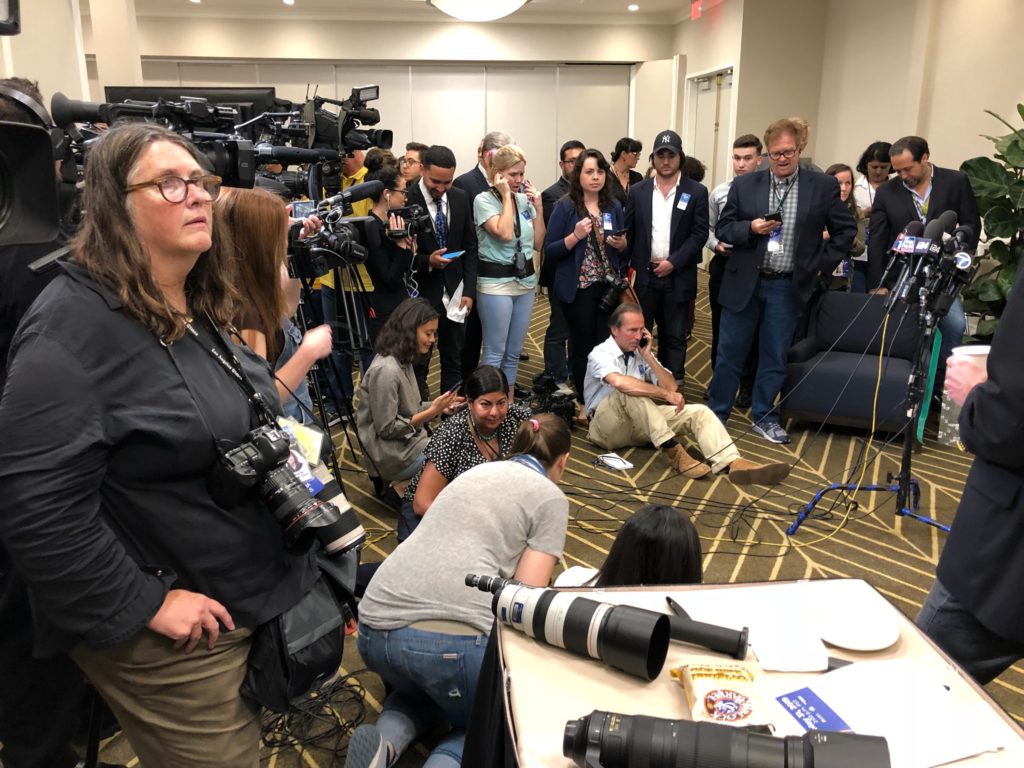

Photographers and reporters, many of whom are freelancers, await 2020 presidential candidate Kamala Harris’s press conference in Pasadena late June. – Photo by Terry Miller / Beacon Media News
AB5 will have a devastating impact on news gathering and ride-sharing in 2020
By Terry Miller
The New Year is just around the corner and 2020 is bringing with it an overabundance of new laws that will seriously affect the lives of many Californians: from a minimum wage increase to cracking down on vaccine exemptions, a major shake-up of California’s employment law to a cap on rent hikes. Pretty heavy stuff to read and inwardly digest.
One of the biggest laws to come out of the California Legislature this year, Assembly Bill 5 (AB5) re-classifies many independent contractors, such as Uber and Lyft drivers, as employees, entitled to benefits and protections, such as sick leave and minimum wage. Several professions are exempt under the new law, however, including doctors, lawyers, accountants, veterinarians and cosmetologists.
But alas, one group who could be seriously affected is freelance photojournalists and the media in general.
Still photographers, photojournalists, freelance writers, editors, and newspaper cartoonists are also included in “professional services” but with important limitations: (1) these speaking professions are limited to 35 “content submissions” per client, per year, Cal. Labor Code § 2750.3(c)(2)(B)(ix) and (x); and (2) video is expressly excluded from the still photography and photojournalism exemption. Cal. Labor Code § 2750.3(c)(2)(B)(ix). Within the journalism profession, the term photojournalist means any visual journalist, including news photographers, videographers, and multimedia journalists who shoot either still or video images.
Newspapers are already being strangled to death with red tape, tariffs and an enormous digital competition, forcing many papers to layoff and condense staff to a bare bottom minimum. The trend for years has been to hire independent contractors in an effort to boost the bottom line.
“When AB5 was signed into law, our members in California were understandably upset,” said Milton C. Toby, president of the American Society of Journalists and Authors, which represents 1,100 freelance writers nationwide, including about 120 in California, told the Los Angeles Times. “Some companies are beginning to not hire or let go of California freelancers in anticipation of the law.”
AB5 which will go into effect Jan. 1, among other things, literally limits the number of assignments a freelancer can shoot (photograph) for any particular publisher to 35 a year. An absurd and arbitrary number dreamed up by the architects of AB5. This could cripple the livelihood of thousands of visual journalists as well as other so-called independent contractors, forcing companies to either employ them as staffers or not use their talents at all.
The National Press Photographer’s Association (NPPA) has filed a lawsuit against the state of California AB5. A press release dated Dec. 17, outlined the lawsuit they filed on behalf of its members:
“The National Press Photographers Association (NPPA) filed a lawsuit today challenging AB5, a California law which discriminates against some visual journalists acting as independent contractors (freelancers) by forcing them to become employees of their clients whether they desire this working relationship or not.
“The lawsuit asserts that the law violates the U.S. Constitution because it penalizes some freelancers while allowing other visual artists (including marketing photographers, fine artists, and graphic artists) to continue to perform as independent contractors, unencumbered by limits on the number of assignments they do. Additionally, AB5 forbids any freelancing by visual journalists who shoot video, a provision that is challenged in the lawsuit as a content-based restriction on speech. For still photojournalists, the bill imposes a limit of 35 ‘submissions’ or assignments per year for any single client, another content-based First Amendment violation. Similar limits are imposed on freelance writers, editors, and newspaper cartoonists.
“NPPA supports the rights of independent visual journalists. They are small businesses that contribute to the economy while helping inform their communities. NPPA has already heard from members in California whose clients plan to drastically reduce their assignments in the next year, resulting in a major loss of income for those freelancers.
“NPPA members impacted by the law range from retirees who will be losing extra income to mid-career professionals whose journalism clients are part of their overall business model. All of the impacted members are experienced journalists, trained in ethics and professional standards, who keep their local community informed on matters of public concern. Their voices will be silenced when the impact of AB5 hits their businesses. Some NPPA members report that their income from certain clients is expected to drop by 60-75% next year due to AB5.”
“From the first reports of the introduction of this bill, NPPA has expressed its concern over the arbitrary and unjust treatment of independent visual journalists under its terms,” said Michael P. King, president of the NPPA. “Unfortunately, despite our best efforts to amend the bill’s language, lawmakers have been unsympathetic and unresponsive to our pleas,” he added. NPPA member David Poller represented the organization and met with the bill’s author, Assemblywoman Lorena Gonzalez (D-San Diego), several times earlier this year in an attempt to make the bill less onerous for photojournalists.
Another concern raised by NPPA in the lawsuit is the impact that the change in employment status will have on the ownership of the copyright to the images made by freelance visual journalists. The default in copyright law is that an employer owns the copyright to the photographs taken by their employees. On the other hand, freelance visual journalists retain their copyright by law unless they give it up. It is common for NPPA’s members to insist that they retain the copyright to their work. An automatic conversion to employment status would jeopardize that copyright status.
“In the visual journalism industry, while many find themselves freelancing as a result of downsizing, many freelancers choose to be independent contractors because it offers them greater flexibility and fewer hours than full-time employment,” said NPPA General Counsel Mickey H. Osterreicher. “Still others chose to be independent photographers because they earn significantly more money and have greater financial security. An independent photojournalist can have a variety of clients which diversifies their income stream. In addition, independent photographers have the flexibility to work on special projects that are foreclosed by the requirements of a staff position.”
“The economic reality for those in the news industry is that nothing will force already struggling media companies to hire more employees,” Osterreicher added.
The lawsuit challenging AB5’s unconstitutional discrimination against journalists was filed in federal court in Los Angeles by NPPA’s pro bono attorneys at Pacific Legal Foundation. “Treating journalists differently based solely on the content of their speech is flatly unconstitutional,” said Jim Manley, an attorney at Pacific Legal Foundation. “The government cannot single-out journalists and deny them the freedom to freelance.”
The American Society of Journalists and Authors, Inc. (ASJA), is also a plaintiff in the suit.
Other Laws that’ll affect our lives include:
- California inches a little bit closer toward its end goal of a $15-an-hour minimum wage.
- Schools will have to find an alternative to suspension when it comes to dealing with unruly students. Beginning July 1, 2020, it will be illegal for schools to suspend students in grades kindergarten through eighth for unruly or disruptive behavior. Senate Bill 419 applies to both public and charter schools. Grades nine through 12 are not covered in the law.
- A new law restricts landlords’ ability to do things like raise the rent or evict tenants. Going into effect Jan. 1, 2020, Assembly Bill 1482 restricts annual rent increases to no more than 5 percent, plus inflation. If you’ve lived in your rental unit for at least a year, you also just got additional protection against being evicted.
- Beginning Jan. 1, 2020, you will have a right to know what personal information businesses are holding onto, and to have that information deleted if you wish.
- Undocumented immigrants under age 26 will be eligible for California’s low-income health insurance, beginning Jan. 1.
On a lighter note: Protecting the sobriety of their fish is very important to Ohioans, so apparently there is a law stating that it is illegal to give alcohol to fish.













